Written by Carlo Vialu, PT, MBA, co-creator of SeekFreaks. He loves promoting function and participation for children and youth with disabilities, from our assessment to our interventions, via continuing education courses. Read more about these courses after the article.
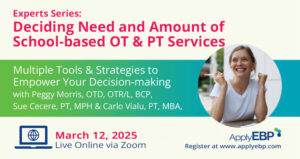
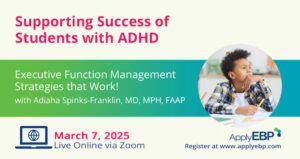
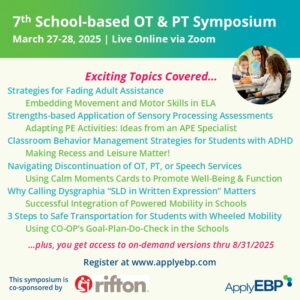
Why read this article?
This updated article will benefit you if:
- This is your first job after graduation
- You are an experienced therapist who is just now entering school-based practice from another setting (outpatient, SNF, hospital, or others)
- You’re a seasoned school-based therapist who needs to brush up and get excited with our practice again
We have also marked our reading list with “(Free)” if it’s free, and “($)” if you have to purchase a copy. This way you can decide which ones you want to read first. Note that all SeekFreaks articles are free!
Tip!
Click here to download the clickable PDF version of the above infographic. Click on a title within the PDF, and you will go straight to the website where that resource is available. Cheers!
1. Read up on the Individuals with Disabilities Education Act (IDEA)
Read up on the Individuals with Disabilities Education Act (IDEA) – the foremost reason why there are therapists working in the schools.
Learn about special education and your role as a related service provider. You can find the whole regulation here (Free) – but you will quickly realize how boring it is to read this document (sorry, IDEA – we still love you!). So, instead start with:
- SeekFreaks article: OTs, PTs & SLPs in Schools…How Did We Get Here? (Free)
- Apply EBP’s School-based vs. Medical-based Services Infographics that you can download (Free)
Then, if you are…
- A PT/PTA: get the APTA FACT SHEET: Providing Physical Therapy Under the Individuals with Disabilities Education Act (Free)
- An OT/OTA: get your hands on Best Practices in Occupational Therapy in School, edited by Gloria Frolek Clark, PhD, OTR/L, BCP, SCSS, FAOTA; Joyce E. Rioux, EdD, OTR/L, SCSS; and Barbara E. Chandler, PhD, OTR/L, FAOTA ($)
- An SLP: ASHA has a great School Services FAQ (Free).
If after reading these, you still have questions, or would like to find certain excerpts from IDEA regulations, you can use the search tab on the IDEA’s website.
Other Laws and Regulations:
There are also other laws and regulations that impact school-based practice services. Here are SeekFreaks articles addressing 2 of them:
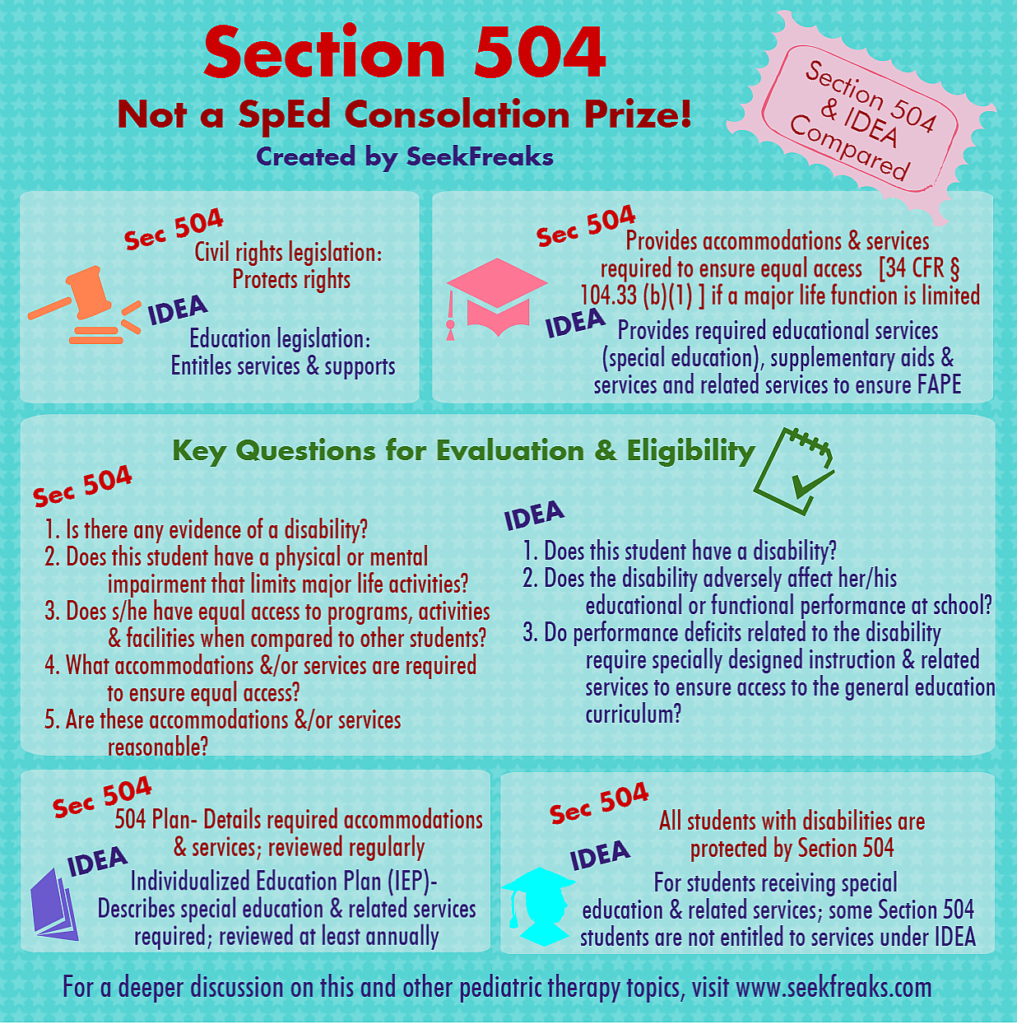
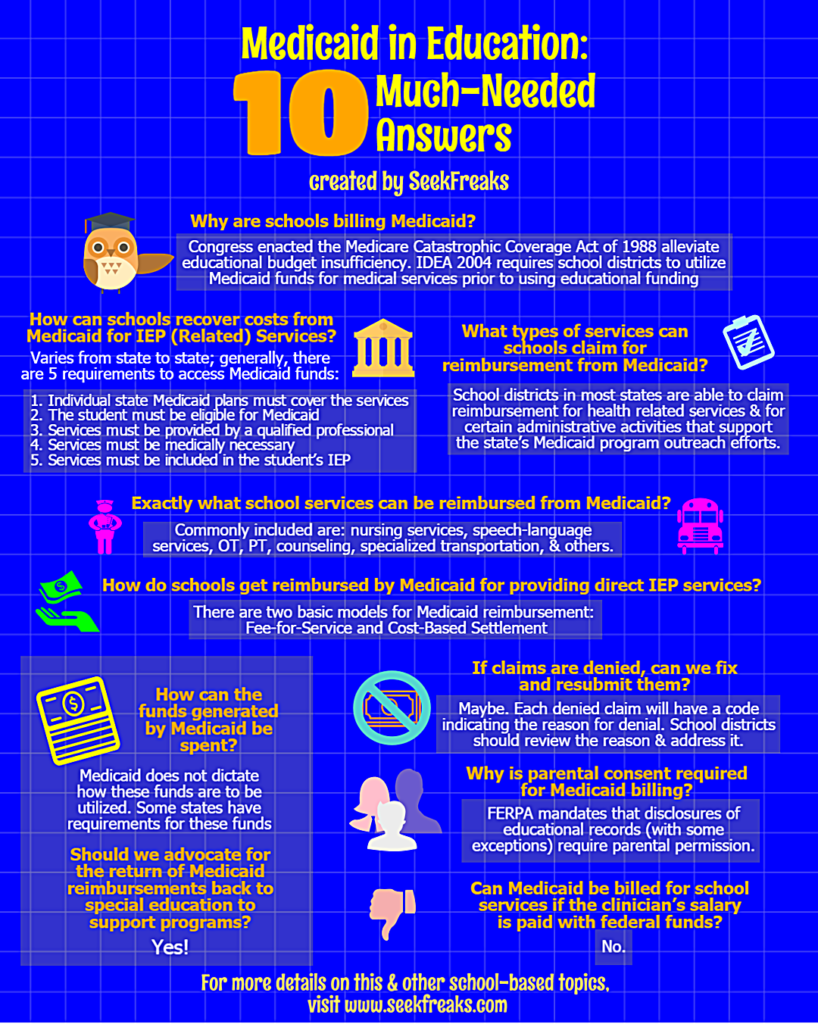
2. Read your state or school district’s School-Based Practice Guideline
Does your state or school district have a school-based practice guideline? SeekFreaks made it easier for you to find your state guideline with our OT, PT & SLP Practice Guide Map (Free).
Print out a copy to take with you, or better yet, download a copy onto your mobile device. By the way, if your state has a practice guide that is not listed in the link, let us know by commenting below or by emailing us at seekfreaks.gmail.com so we can add it.
The practice guide will give you specific guidance as to how to practice in schools within your own state or school district. It will often explain how Individualized Education Program (IEP) teams meet and make decisions, and your roles and responsibilities as a related service provider (yes, you will be considered a related service provider in school-based practice, so get used to this term).
These practice guides may also cover:
- decision-making processes for determining a student’s eligibility for special education services
- establishing students’ goals, and identifying their needs for related services
- expertise and competencies expected of school-based therapists within your school districts
- service delivery models, as well as, frequency and intensity of services.
If your state and school district does not have a practice guide, do not fret. Here are some starting points to learn more about your role in the school.
- For OT/OTA: Occupational Therapy Services in Early Childhood and School-Based Settings (Free): Published by the American Journal of Occupational Therapy, it provides guidance for OTs practicing in school-based practice.
- For PT/PTA
- Role of School-based Physical Therapy (Free): Provides a short description of the role of PTs in our schools.
- Updated Competencies for Physical Therapists Working in Schools: A list of skills and knowledge therapists need to possess to provide services to students with disabilities.
- For SLP: ASHA Roles and Responsibilities of Speech-Language Pathologists in Schools: Created by the American Speech Language and Hearing Association, this website containing various resources to learn about SLP’s role in schools, with great examples of “Dos and Don’ts.”
State Practice Acts
While you’re reading your practice guide, might as well revisit your state practice acts to review what you should do, and what you can and cannot do under your license, registration and/or certification.
- PT/PTAs can find links to all states’ practice acts here (Free).
- SLPs can find state information here (Free).
- OT/OTAs – unfortunately, I still can’t find a complete listing for you. If you just search online for “occupational therapy practice act” plus “the name of your state”, you should be able to find it easily.
3. Learn about the Individualized Education Program (IEP)
As school-based practitioners, Individualized Education Programs (IEPs) will be a huge part of your life. Whereas, medical-based settings use doctor’s prescriptions and medical documentation, the therapists in the educational setting rely on what is contained in the students’ IEPs.
Of course, you will find some guidelines on IEPs, including learning modules, on the IDEA website by clicking here (Free) then selecting Individualized Education Program. You can also visit your state education department’s website to find specific guidance within your state.
However, such guidance is often very general. How do they apply specifically to therapists? For this information, read the 4-part SeekFreaks series IEP 4.0 that begins here (Free).
This is a quick primer on our responsibilities in the IEP process focusing on 3 particular IEP sections, the Present Level of Academic Achievement and Functional Performance, Goals & Progress Monitoring, plus a non-IEP, but just as important item, the Plan of Care.
You can also help your students and their families through the IEP process with these handy-dandy checklists by SeekFreak Laurie Ray:
And for creating IEP Goals, read Laurie’s 9 Quick Tests for Student IEP Goals: How many can you pass? (Free).
4. Get Cozy with the ICF
If you read materials 1-3 above thoroughly, you will realize that there is a lot of talk about participation. So you would need to brush up on the International Classification of Function, Disability and Health (ICF) so you can become fluent in describing impairments, activities and participation, and when setting participation goals with the IEP team.
It would help you to skim through the ICF-Children and Youth Version (Free). It may be a little less tedious than reading the full IDEA regulations. However, it can still be snooze-inducing.
If you like a quick primer, read Recognizing ICF Domain Words…Amusing Musings (Free).
This is an updated version that aligns the ICF domains with the term used in the Occupational Therapy Practice Framework (OTPF-4). Wouldn’t it be great if we all could speak each other’s lingo?!
And don’t miss CanChild’s take on the ICF with the catchy title, “F-Words”. Each F-Word corresponds to a domain of the ICF. They also just created videos and other materials to help you explain each F-Word with your colleagues and clients. Visit their F-Words Knowledge Hub (Free).
5. Are You Up for Additional Readings?
Well, if you are reading this far, then you must be! Here are some recent and recent-ish articles that would make for great reading to make you extra-effective in school-based practice. This list includes free articles, systematic reviews and websites on general school-based topics and interventions, and those that pertain to some of the most common pediatric health conditions.
- For OT/OTAs:
- Effectiveness of Paediatric Occupational Therapy for Children with Disabilities: A Systematic Review (Free) by Iona Novak and Ingrid Honan, 2019. There’s so much Yahoos, Uh-Ohs and Hmmms that will keep you reading and debating this with your colleagues. Don’t let the title fool you. Many of the articles reviewed did include not just OT but also PT, and a couple included Speech interventions.
- Also, read Peggy Morris’ SeekFreaks take on this article (Free) before you dive in to the whole Novak and Honan article.
- Interventions Within the Scope of Occupational Therapy to Improve Children’s Academic Participation: A Systematic Review (Free) by Grajo et al, 2020
- For PT/PTAs:
- Determining Need for School-based Physical Therapy under IDEA: Commonalities Across Practice Guidelines (Free) by Vialu and Doyle, 2017. Learn 2 Procedural Requirements, and 5 yes/no questions that your IEP team can adopt. Yes, this article covers only PT services. We do have plans to write a similar article for OT services when we do find the time. However, I won’t be surprised if the results will be similar since most guidelines cover both OT and PT, and some even all 3 services.
- There’s a series of informative articles that came from PT COUNTS, a study on provision of school-based PT services:
- Relationship of School-Based Physical Therapy Services to Student Goal Achievement (Free) by McCoy et al, 2020
- Student Outcomes of School-Based Physical Therapy as Measured by Goal Attainment Scaling (Free) by Chiarello et al, 2016
- Outcomes for Students Receiving School-Based Physical Therapy as Measured by the School Function Assessment (Free) by Effgen et al, 2016
- For SLPs:
- ASHA/N-CEP Evidence-based Systematic Reviews (Free): Where you will find a collection of SLP-related systematic reviews on various topics and interventions
- How about some quick SeekFreaks list of handy fact sheets and resources:
- 10 Handy APTA Fact Sheets (Free)
- 10 Handy AOTA Fact Sheets (Free)
- 10 Handy ASHA Resources (Free)
Can’t have enough to read? Here are some SeekFreaks’ picks on more Evidence-based Practices for common childhood diagnoses:
- For Developmental Coordination Disorder:
- International clinical practice recommendations on the definition, diagnosis, assessment, intervention, and psychosocial aspects of developmental coordination disorder (Free) – by Blank et al, 2019.
- Physical Therapy Management of Children With Developmental Coordination Disorder: An Evidence-Based Clinical Practice Guideline From the Academy of Pediatric Physical Therapy of the American Physical Therapy Association (Free) – by Dannemiller et al, 2020
- For Autism Spectrum Disorder:
- AFIRM’s Evidence-based Practices (EBPs) for Individual with Autism (Free) – Go through their site, click on a specific EBP and learn more about effective strategies you can include in your toolbox. For additional readings on Interventions for Individuals with ASD
- Occupational therapy practice guidelines for children and adolescents with Autism Spectrum Disorders ($) – Not free, but worth every cent if you would like to find out what OT interventions work and don’t work for individuals with ASD – by Tomchek, S., & Koenig, K., 2016.
- For Cerebral Palsy:
For Providing Services Virtually
Here is a SeekFreaks article and a SeekFreaks list of resources:
- What Interventions Work in Teletherapy? The Evidence of What Works Has Not Changed…Just the Way We Deliver the Service! (Free)
- Free Resources for OT, PT & Speech Services During the COVID-19 Pandemic (Free)
How else can you stay on top of current evidence that affect your practice?
Subscribe to Apply EBP and be notified when they release their 3 Practical Takeaways on noteworthy articles. See sample takeaways below:
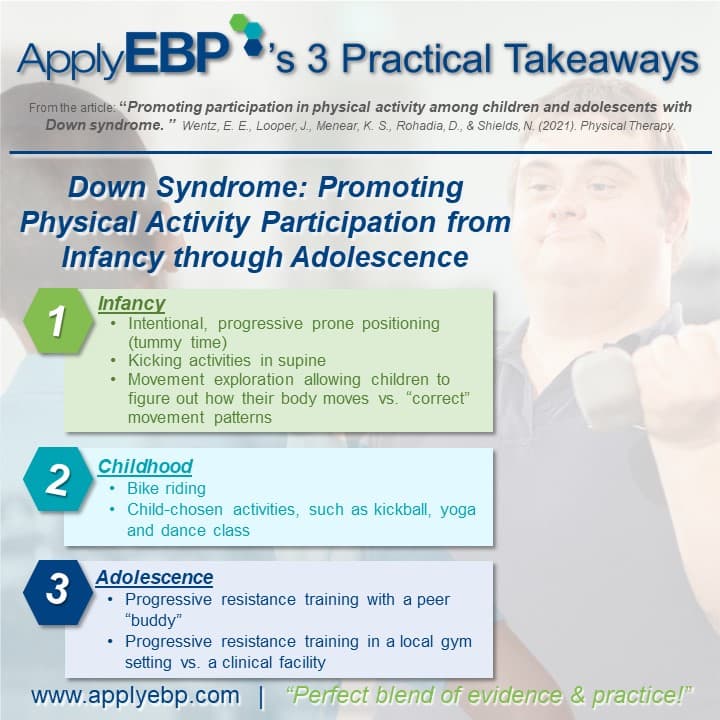
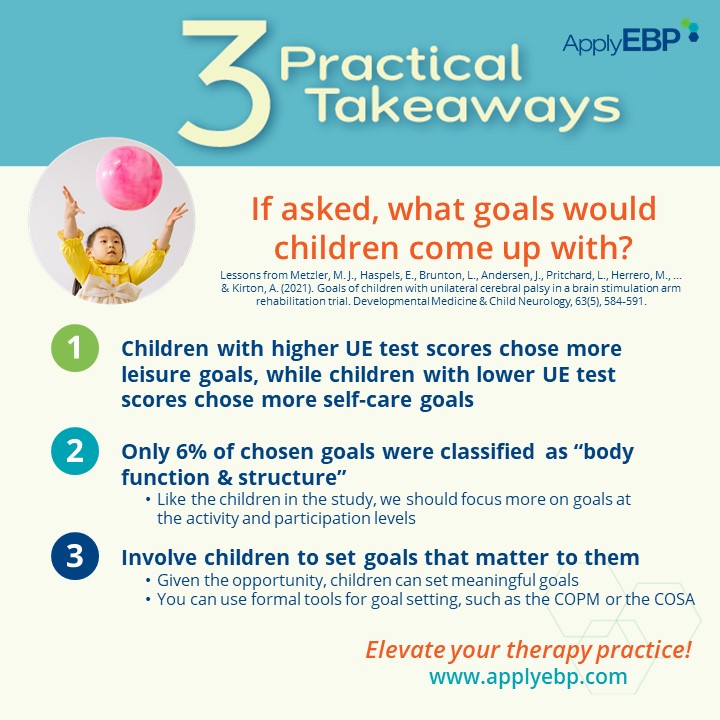
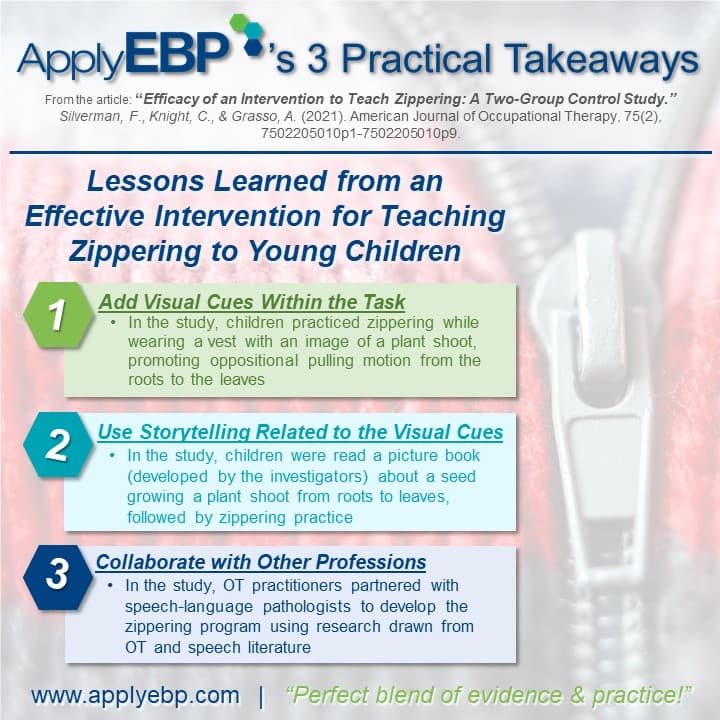
Have a great school year to one and all!
Join Carlo Vialu and other experts at these all evidence-based, all practical continuing education online courses:
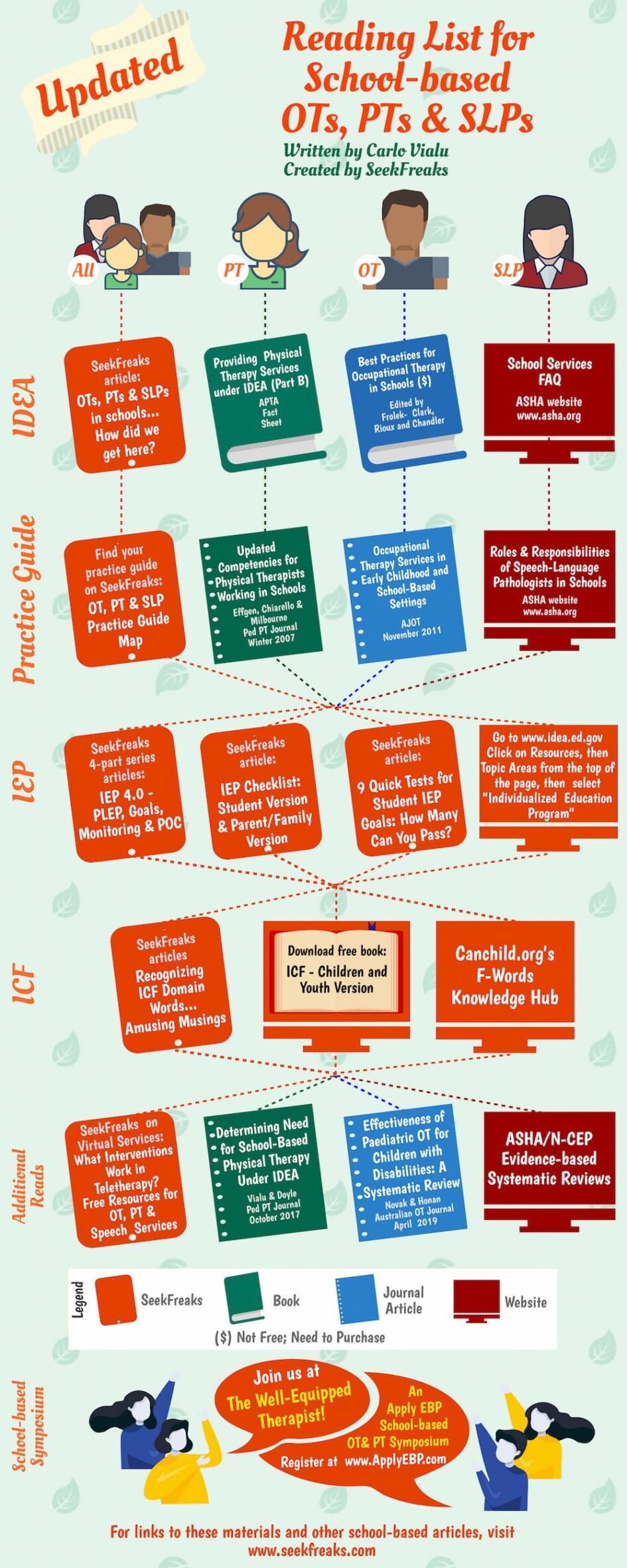
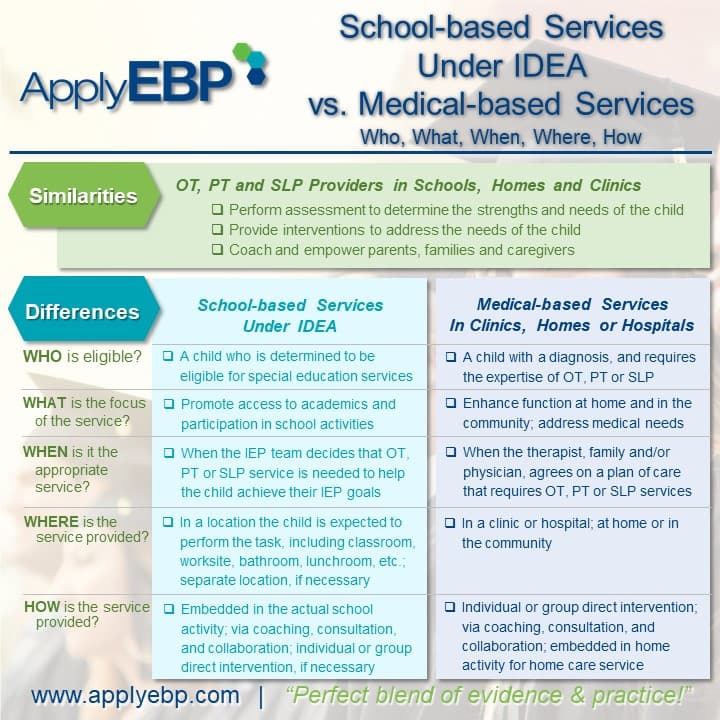
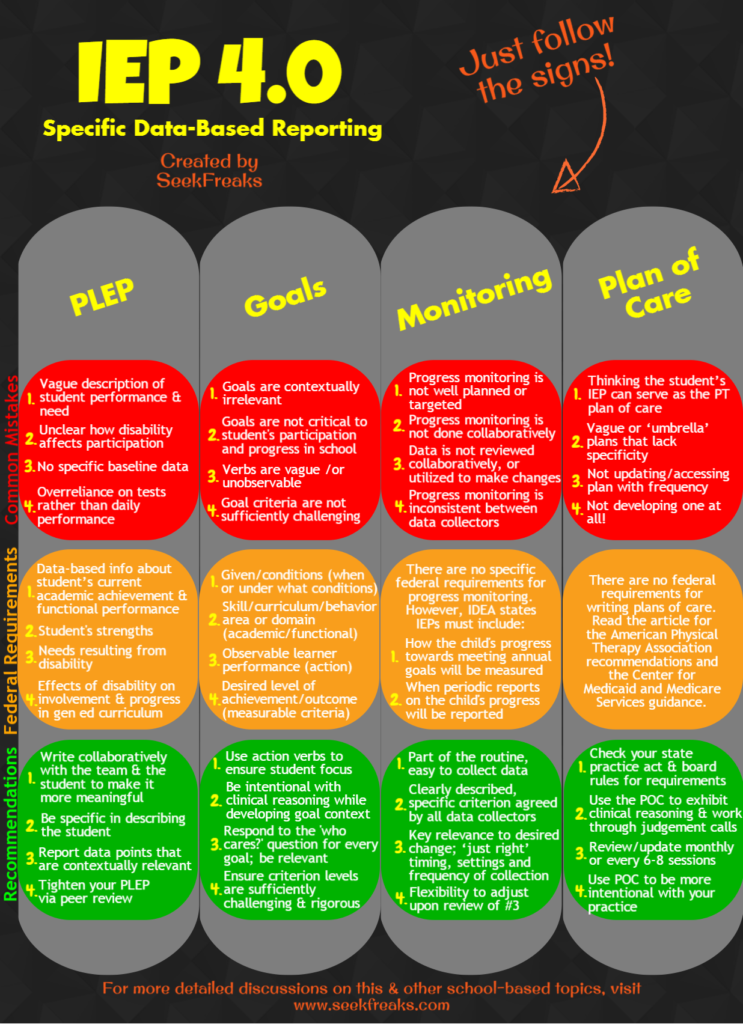
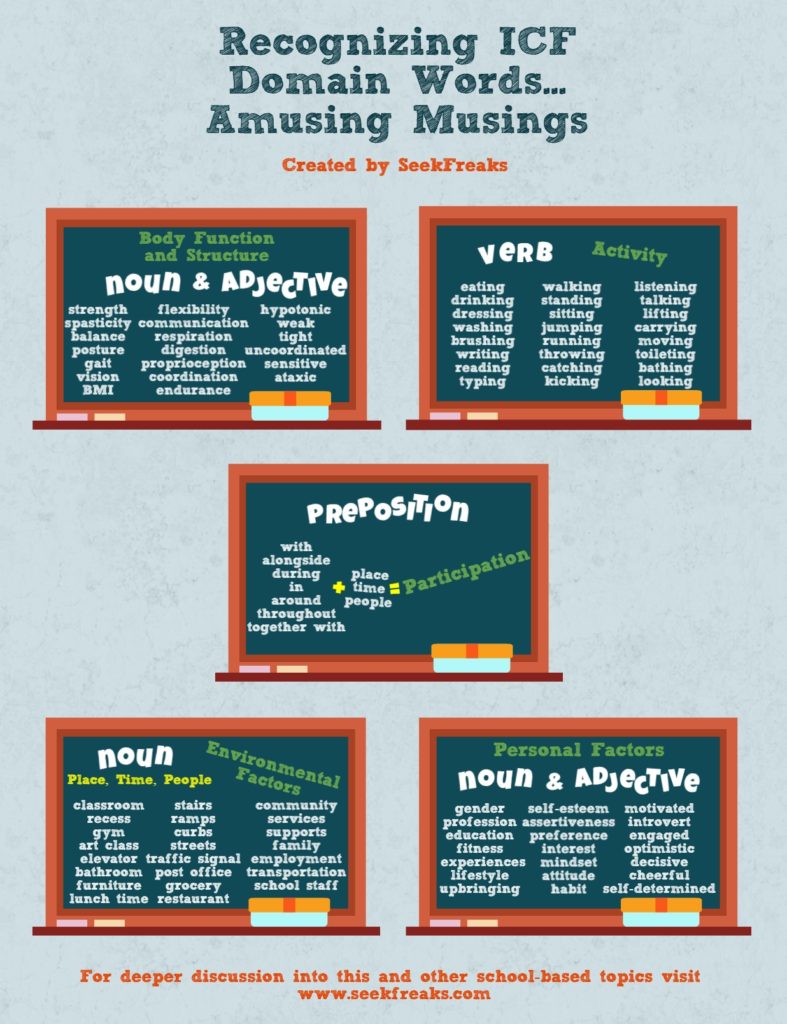




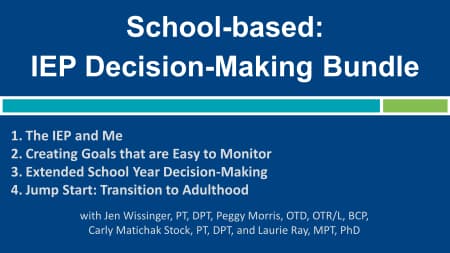
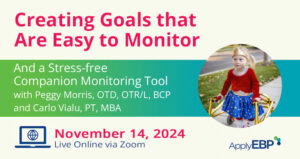

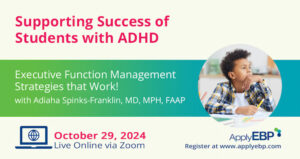
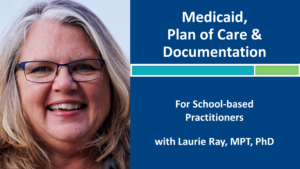
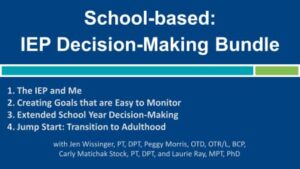
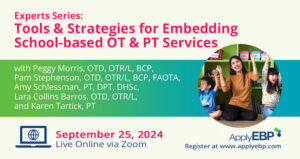
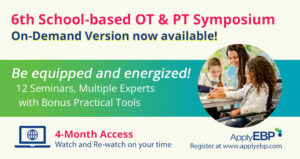
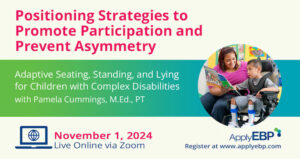
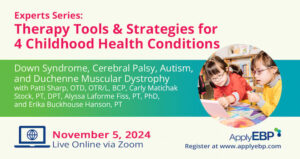
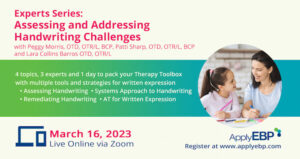
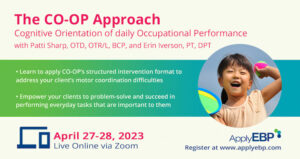
2 Pingbacks